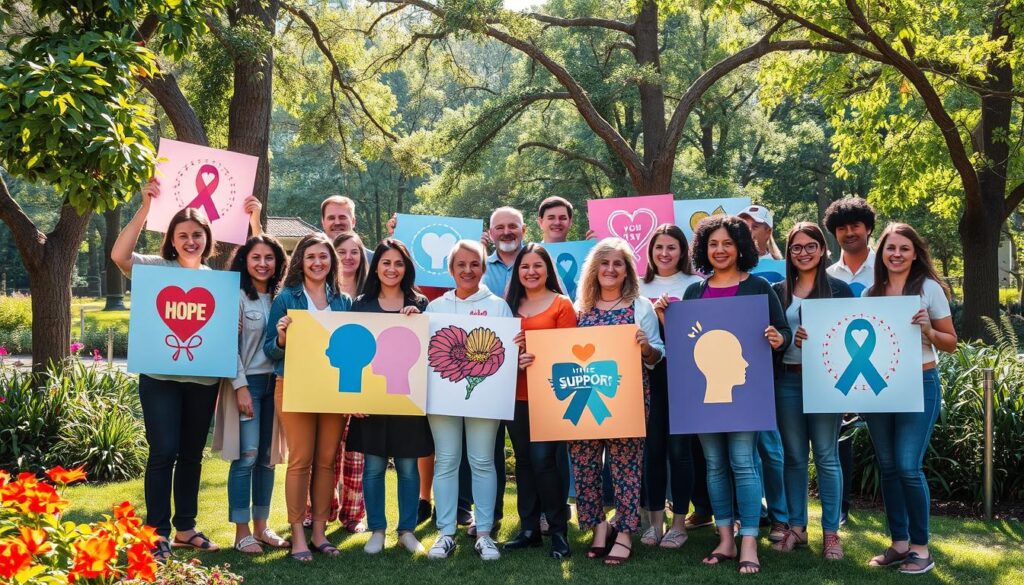Did you know that nearly 1 in 5 Americans experiences a mental health issue each year? This staggering statistic underscores the urgent need for effective mental health resources that are accessible to everyone. Fortunately, there are countless opportunities to access free resources aimed at supporting emotional well-being. Whether you are dealing with anxiety, depression, or any other mental illness, obtaining timely help is crucial for effective treatment and recovery.
It’s essential to recognise that many resources exist at no cost, making them readily available for individuals facing diverse challenges. Numerous established mental health organisations and government agencies can provide comprehensive support tailored to your needs. For more information on how you can access these invaluable resources, check out the detailed guide from the National Institute of Mental Health. With just a few clicks, you’ll find services that resonate with your situation and contribute positively to your mental health journey.
Key Takeaways
- Approximately 20% of Americans encounter mental health issues annually.
- Accessing free resources is vital for managing emotional well-being.
- Many support services are tailored to individual needs.
- Established organizations offer credible information and guidance.
- Timely help can significantly improve mental illness treatment outcomes.
Understanding Mental Health Resources
Mental health resources are pivotal in aiding individuals grappling with mental health issues. They span a wide range, including *therapy options*, counselling services, and educational tools. Grasping the scope of these resources can profoundly affect one’s recovery path and emotional state.
Definition and Importance
Resources specifically designed for mental health offer critical support by linking individuals with the appropriate mental health help. Their influence is significant; they elevate mental health awareness and improve life quality for many. By ensuring support is readily available, they are instrumental in averting the worsening of mental health conditions.
Different Types of Resources
A plethora of mental health resources exists to meet various needs:
- Therapy Options: This encompasses individual, group, and family therapy forms.
- Counselling Services: Professional counselling offers tailored strategies and coping methods.
- Educational Materials: Books, articles, and online platforms provide knowledge on mental health conditions.
- Peer Support Groups: These informal meetings create a community among those facing similar challenges.
- Hotlines and Crisis Services: Immediate help from trained professionals is available for urgent situations.
Each resource is crafted to support different aspects of emotional well-being. This allows individuals to select options that align with their specific needs and preferences.
Where to Find Mental Health Resources
Seeking mental health resources is paramount for those in need of support. Community health centres are pivotal in offering services that resonate with local needs. They are staffed by mental health professionals who grasp the unique challenges individuals face in their communities. This environment is conducive to fostering connections and healing, making it a valuable resource for many.
Community Health Centres
Community health centres provide a spectrum of services addressing various mental health concerns. These facilities typically offer:
- Individual and group therapy sessions
- Child and youth mental health services
- Support for substance use disorders
- Wellness programs and workshops
By leveraging local mental health resources, individuals can access vital services that align with their needs in a familiar environment.
Online Platforms
In our digital era, online mental health resources have gained immense popularity. Mental health websites and apps offer individuals the convenience of seeking help without geographical constraints. These platforms provide:
- Teletherapy options with licensed professionals
- Support forums for peer interactions
- Informational articles and self-help tools
- Accessibility to digital support systems for ongoing care
With these resources, users can navigate their mental health journeys comfortably and privately. This empowers them to take charge of their wellbeing.
Local Hotlines and Support Services
The role of local hotlines and support services in mental health crisis management is paramount. These entities offer immediate assistance and guidance to those grappling with emotional challenges or crises. By engaging with a suicide prevention hotline or text support services, individuals can access professional help tailored to their specific needs.
National Suicide Prevention Lifeline
The National Suicide Prevention Lifeline operates continuously, providing a lifeline for those in distress. This hotline offers confidential support and crisis intervention, available to anyone in need. By dialing the Lifeline, individuals connect with trained professionals who offer empathy and guidance. It serves not only those at risk but also friends and family seeking advice on supporting loved ones.
Crisis Text Line
The Crisis Text Line offers a discreet method for individuals to reach out for help. This service connects users with trained crisis counsellors via a simple text message. By texting a designated number, individuals in crisis receive immediate, confidential support. This format provides a unique and effective means of communication during challenging times.
The National Suicide Prevention Lifeline and the Crisis Text Line underscore the critical need for accessible crisis support services. Leveraging these resources can profoundly impact the lives of those facing mental health challenges. For further information on enhancing mental health support, visit NAMI Helpline.
Non-Profit Organizations Providing Support
Initiating the journey towards mental health resources often commences with the aid of non-profit entities. These organizations, such as Mental Health America and the National Alliance on Mental Illness, are pivotal in offering support and advocacy. They strive to enhance mental well-being and raise awareness about mental health issues through a variety of services.
Mental Health America
Mental Health America stands at the forefront of non-profit mental health support. It is committed to promoting mental wellness through education, advocacy, and support services. The organization provides a plethora of resources, including:
- Educational materials to enhance understanding of mental health
- Screening tools for various mental health conditions
- A comprehensive directory of local mental health services
This entity underscores the significance of mental health advocacy. It aims to establish a society where all individuals have unfettered access to vital mental health resources.
National Alliance on Mental Illness
The National Alliance on Mental Illness, commonly referred to as NAMI, offers extensive support for those affected by mental illness. Their programs encompass:
- Support groups for individuals and families grappling with mental health challenges
- Educational programs that offer insights and coping strategies
- Advocacy initiatives aimed at enhancing access to mental health treatment and services
NAMI dedicates itself to advancing mental health advocacy. It endeavors to create an environment where individuals can readily access the support they need.
Mental Health Resource Directories
Access to mental health resource directories significantly simplifies the quest for support. These directories act as exhaustive compilations, offering critical information to those in need. They aggregate a variety of services, facilitating the identification of local therapists, support groups, and other vital mental health resources. Whether one navigates online platforms or consults printed materials, numerous trusted directories cater to diverse needs.
Benefits of Using Directories
The advantages of leveraging mental health resource directories are manifold:
- They provide streamlined access to a broad spectrum of professionals and services.
- They verify the credibility of listed providers, ensuring their reliability.
- They offer a user-friendly approach to finding help, alleviating stress during difficult times.
Examples of Trusted Directories
Several esteemed mental health directories can aid in the search for support. Notable examples include:
- Substance Abuse and Mental Health Services Administration (SAMHSA) – A national resource with a comprehensive search tool for local treatment centers and support services.
- Psychology Today – Offers an extensive directory of therapists, aiding users in filtering by location and specialty.
Exploring these trusted mental health directories enables individuals to locate the necessary resources for their mental health journey.
University and College Mental Health Services
Universities and colleges are pivotal in fostering student mental health through diverse support mechanisms. They house dedicated campus counselling services, offering students vital resources for their mental well-being. These centres provide professional guidance, addressing a spectrum of mental health issues. This ensures students feel secure and supported in their academic and personal pursuits.
Campus Counselling Centers
Campus counselling services encompass a broad array of interventions, including individual therapy, group sessions, and workshops. These focus on practical strategies for mental health management. Each centre serves as a sanctuary for students to discuss their challenges openly. Students are urged to leverage these university mental health services for stress management, anxiety, and personal growth. Additionally, many centres offer specialized support for LGBTQ+ students, addressing their unique challenges.
Peer Support Initiatives
Peer support programmes are instrumental in enhancing student well-being. They offer platforms for students to share experiences and build community. These initiatives promote open dialogue about mental health, dispelling stigmas associated with seeking help. Through participation, students find solace in shared experiences and acquire effective coping strategies, positively influencing their student mental health.
How to Evaluate Mental Health Resources
Seeking mental health assistance necessitates a thorough evaluation of available resources. It is imperative to assess the credibility of services to ensure the provision of safe and effective support. This process is tailored to address the individual’s unique circumstances. By adopting a meticulous approach, individuals can identify resources that align with their personal mental health evaluation requirements.
Assessing Credibility
Assessing the credibility of mental health services is a fundamental step in accessing support. Several factors should be considered:
- Verify the qualifications and licensing of mental health professionals.
- Seek feedback from previous clients to gauge their experiences.
- Research the reputation of agencies providing the services.
Understanding Your Needs
Reflecting on one’s mental health needs is crucial before exploring resources. Key questions to consider include:
- What specific type of support do I require? (e.g., therapy, medication, support groups)
- What are my comfort levels with various types of services?
- Do I prefer in-person visits, or would telehealth be more suitable for my situation?
An effective approach to assessing mental health needs significantly enhances the likelihood of finding suitable resources.
Telehealth and Online Therapy Options
In today’s digital age, telehealth services have revolutionized the delivery of mental health care. These services offer unparalleled convenience and flexibility, making it easier for individuals to access support. Whether through video calls or phone consultations, the benefits of online therapy are vast and varied.
Benefits of Teletherapy
Many individuals discover that the online therapy benefits align better with their lifestyles than traditional in-person sessions. Some notable advantages include:
- Increased accessibility to mental health professionals, including specialists from diverse regions.
- Reduction in travel time, allowing clients to fit appointments seamlessly into their schedules.
- Comfort of engaging in therapy from the safety of one’s home.
- Variety of online counselling options tailored to individual preferences.
Popular Telehealth Platforms
Several platforms have emerged as leaders in providing telehealth services. Well-known options include BetterHelp and Talkspace, each offering unique features that cater to various needs:
- BetterHelp: This platform provides a range of therapy modalities, including individual and couples therapy, with flexible subscription plans.
- Talkspace: Known for its user-friendly interface, it offers therapy through text, audio, and video messages.
These popular teletherapy platforms aim to support individuals on their mental health journeys. The choice between different options often depends on personal preferences and specific therapeutic needs. To learn more about how to choose the right platform, you might find this resource on mental health services informative.
Community Support Groups

Community support groups are crucial for individuals facing mental health challenges. They provide a space where people can connect and share their experiences. The significance of peer support in these groups is immense, as it helps combat isolation and builds resilience. Through conversations, the exchange of coping strategies, and the formation of friendships, a supportive environment is created, facilitating healing.
Importance of Peer Support
Peer support is pivotal in mental health recovery. Members of these groups offer empathy, understanding, and validation that professional services sometimes lack. This shared experience enhances a sense of belonging, allowing individuals to openly express their feelings. By engaging in these groups, participants gain access to various resources and strategies to manage their challenges.
Finding Local Support Groups
Finding local support groups can significantly enhance your journey towards well-being. Here are a few suggestions:
- Check with community centres that often host mental health events and support groups.
- Visit local libraries that may have bulletin boards listing various community resources.
- Contact mental health organizations, as they frequently maintain records of local support groups.
Mental Health Apps and Digital Tools
In today’s fast-paced world, mental health applications have gained immense popularity in supporting emotional well-being. These wellness apps provide users with various tools and resources, making it easier to manage stress and anxiety. With vibrant features designed for mindfulness practices, individuals can find a range of options tailored to their needs.
Popular Mental Health Apps
Several mental health apps have stood out for their effectiveness in promoting well-being. For instance, Headspace offers guided meditations, while Calm focuses on sleep and relaxation techniques. Both of these digital mental health tools facilitate user engagement and provide a convenient way to incorporate mindfulness into daily routines.
How Apps Can Support Your Wellbeing
Mental health apps support well-being in various ways. Users can benefit from:
- Guided meditation sessions for relaxation
- Journaling options to track emotions
- Breathing exercises to manage anxiety
- Progress tracking to measure improvement
By integrating mental health applications into everyday life, individuals can enhance their coping strategies and emotional health. These wellness apps act as valuable adjuncts to professional therapy, encouraging users to take proactive steps toward mental wellness.
Government Initiatives and Programs
The significance of government support in enhancing mental health services across communities cannot be overstated. Federal mental health programs are pivotal in ensuring the availability of accessible and effective resources for those in need. These initiatives are crafted to provide financial backing and support, aiming to elevate the standard of mental health care nationwide.
Federal Mental Health Services
In the United States, a myriad of federal mental health programs are dedicated to serving diverse populations. These endeavors concentrate on:
- Offering financial aid for mental health services.
- Enhancing awareness and education regarding mental health issues.
- Fostering collaboration between federal entities and local organisations.
The integration of these services into community programs underscores the necessity of accessible care for all. This strategy not only enhances the well-being of citizens but also fortifies local support networks.
State-Level Resources
Complementing federal efforts, state-level mental health resources offer bespoke support tailored to community-specific needs. Local government initiatives, though varied by state, encompass:
- Specialised programs for specific groups, such as veterans or youth.
- Community outreach initiatives aimed at diminishing mental health stigma.
- Collaborations with non-profit entities to broaden service availability.
By leveraging both federal mental health programs and state-level resources, a robust support network is established. Engagement with these initiatives fosters a more informed, resilient populace, better equipped to navigate mental health challenges. For further details on participating in these programs and initiatives, visit this link.
Advocacy and Awareness Campaigns

Engagement in mental health advocacy is pivotal in transforming societal attitudes and combating stigma around mental health issues. The significance of awareness is profound, as it cultivates understanding and acceptance within communities. When individuals unite to support local mental health campaigns, they magnify their collective voice, driving essential change.
Importance of Mental Health Advocacy
Mental health advocacy is crucial for advocating for better policies and augmenting funding for mental health resources. Awareness initiatives can lead to enhanced access to care and comprehensive support systems for those in need. By actively participating in these movements, individuals not only educate themselves but also contribute to a broader cultural shift that prioritizes wellbeing.
Engaging with Local Campaigns
Participating in local mental health campaigns can be an empowering experience. Community engagement in these efforts helps establish a network of support for those affected by mental health challenges. Here are a few steps to consider when getting involved:
- Research local campaigns focusing on mental health issues.
- Attend community meetings or events to connect with others.
- Volunteer your time or skills to support advocacy initiatives.
- Spread the word on social media to raise awareness.
Taking the First Step Toward Help
The path to mental health support is often daunting, exacerbated by the pervasive stigma surrounding mental health issues. It is imperative to dismantle this stigma, creating a space where seeking assistance is viewed as a positive act rather than a source of shame. Recognising the courage it takes to seek help is crucial. The initial step involves acknowledging your emotions and realising that numerous others share your plight.
Overcoming Stigmas
The fear of being judged can deter many from seeking the help they need. Therefore, it is essential to challenge this narrative. Engaging in open dialogue with loved ones can help dismantle these barriers. By sharing your experiences and emotions, you foster mutual understanding and highlight the universality of these challenges. This fosters a sense of community and support, crucial in the quest for mental health support.
How to Reach Out for Support
Initiating the process of seeking help can begin with a conversation with a trusted individual. Alternatively, you can reach out to professional therapists or local support services to discuss your mental health concerns. The array of resources available, from therapy to support groups and hotlines, can guide you. Remember, seeking help is not merely a step towards personal development; it is a pivotal move towards improving your overall well-being.
